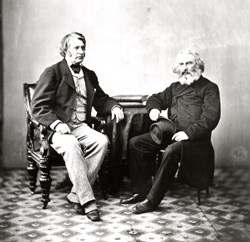
Something for the Great Cause: The Influence of Longfellow’s Poems on SlaveryHenry Longfellow’s grandson and family historian Henry W. Longfellow Dana left notes for a lecture he gave in 1940 called "The Negro in Literature: The Last Hundred Years in America." Dana began by citing his grandfather’s "desire from the age of 17 to do something ‘for the great cause of Negro Emancipation.’" This desire was "rekindled by Freiligrath in Germany and Dickens in England." Following an extended correspondence, Longfellow met Ferdinand Freiligrath, the German revolutionary poet and translator of many of Longfellow’s works into German, on his six-month European tour in 1842. Freiligrath vociferously opposed slavery and expressed his radical political views in his poetry. Charles Dickens, the British novelist renowned for exposing social injustices, began his tour of America in Boston in late January 1842. During his two weeks in Boston, Dickens spent time with Henry Longfellow and dined with him at the house. Later that year, Longfellow visited Dickens in London. After reading Dickens’s manuscript of American Notes, Longfellow wrote to his friend Charles Sumner from Dickens’s study on October 16, 1842: "I have read Dickens’ book. It is jovial and good natured, and at times very severe. You will read it with delight and, for the most part, approbation. He has a grand chapter on Slavery. Spitting and politics at Washington are the other topics of centure [sic]. Both you and I centure them with equal severity, to say the least." At Sumner’s request, Henry agreed to write and publish a set of anti-slavery poems: "Write some stirring words that shall move the whole land. Send them home and we will publish them." During a violent storm at sea on his return to America, Longfellow wrote seven poems, including "The Quadroon Girl," "The Slave Singing at Midnight," and "The Witnesses." In a letter to Freiligrath, January 6, 1843, he described the event:
Upon their publication in December 1842, Longfellow received impassioned reviews, both positive and negative. Despite the outcry among some segments of the population, Longfellow stood behind his poems. Within a few weeks of publication he wrote to his father: "Some persons regret that I should have written them, but for my own part I am glad of what I have done. My feelings prompted me, and my judgment approved and still approves." Longfellow allowed the New England Anti-Slavery Tract Society to reprint and distribute these poems for free, for which they expressed much gratitude. W. Ware’s review of Poems on Slavery in the Christian Examiner, January 1843, was among the favorable: "Especially happy are we to be able to count one of Mr. Longfellow’s genius and celebrity among those friends of universal liberty, who are willing to speak their word in its behalf. In this little book of poems he has spoken with feeling, with truth, and eminent poetic beauty." Poet and abolitionist John Greenleaf Whittier felt Poems on Slavery had "been an important service to the Liberty movement" and inquired as to whether Longfellow would be a candidate for Congress on the Liberty Party ticket. "Our friends think they could throw for thee one thousand more votes than any other man." Longfellow responded to his request in September 1843:
H.W.L. Dana observed that there had been "Indignation in the South and in the conservative North against these poems" and that they were "Omitted from the Philadelphia edition of Longfellow." A letter from Rufus Wilmot Griswold, editor of Graham’s Magazine, to Henry W. Longfellow, January 7, 1843, explained this: "I thank you for the Poems on Slavery. That last word never is seen in a Philadelphia magazine. You will understand therefore the reason of the brief notice I have made of it. Mr. Graham objected even to publishing the title of the work!" In a journal entry on August 1, 1846, Longfellow recorded:
By 1862, during the Civil War, the editors of the Evening Post reflected on Longfellow’s Poems on Slavery, written two decades earlier, and characterized it as “The Poet’s Warning.” They wrote:
|
Last updated: September 13, 2025
